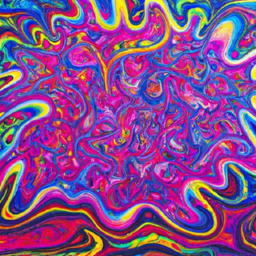LSD (lysergic acid diethylamide) is a synthetic chemical, made from a substance found in ergot, which is a fungus that infects rye (grain). It was first synthesized in 1938 by Swiss chemist Albert Hofmann, who accidentally discovered its psychoactive properties five years later. Since then, LSD has been used recreationally, spiritually, and medicinally, and has been the subject of much controversy and misinformation.
In the 1960s, LSD became popular among counterculture movements and was associated with the anti-war and civil rights movements. However, due to its illegal status and the negative media attention it received, research into its potential therapeutic uses was largely halted. In recent years, however, there has been a renewed interest in studying LSD and other psychedelic substances for their possible benefits in treating mental health disorders.
One recent development in the world of LSD is the emergence of Liquid Staking Derivatives (LSD), a type of cryptocurrency that allows users to earn rewards for staking their tokens. According to InvestorsObserver, LSD has received a bullish rating and has seen a significant increase in value. While this may seem unrelated to the psychedelic drug, it is an example of how LSD has continued to evolve and find new applications.
Another recent development is the discovery of a non-hallucinogenic LSD analogue that may be able to treat mood disorders and chronic stress without the hallucinations. This could be a game-changer for those who are interested in the potential benefits of LSD but are hesitant about its psychedelic effects.
Despite its reputation as a recreational drug, LSD has a rich history in art and culture. In the book "A Boundless Vision: Exploring the Psychedelic World of Joe Roberts," the author delves into the psychedelic art scene and features the work of artist Joe Roberts, who has been heavily influenced by LSD and other psychedelic substances. The book serves as a reminder of the impact that LSD has had on the art world, and how it continues to inspire artists today.
On a more practical note, LSD has also had an impact on transportation. In Chicago, for example, the DuSable Lake Shore Drive (LSD) has been undergoing construction to improve safety and accessibility. While this may seem like a mundane topic, it highlights the fact that LSD has become a part of our everyday language and culture.
When it comes to the science of LSD, researchers are interested in studying its effects on the brain and its potential therapeutic uses. As mentioned earlier, there has been a renewed interest in studying LSD and other psychedelics for their potential to treat mental health disorders such as depression, anxiety, and PTSD. The exact mechanisms of how LSD affects the brain are not yet fully understood, but studies have shown that it can increase connectivity between brain regions and promote neuroplasticity.
To further explore the potential benefits of LSD, blockchain technology has been used to create a DeFi Ecosystem for Liquid Staking Derivatives (LSDs). Tenet, the first layer-1 blockchain to do so, has partnered with Ankr to provide users with a secure and efficient way to trade LSDs. While this may seem like a niche application, it shows how LSD is being integrated into modern technology and finance.
Finally, it's worth noting that LSD is still a Schedule I drug in the United States, meaning it is illegal and considered to have no medical use. However, this hasn't stopped researchers from exploring its potential therapeutic benefits. In fact, Johns Hopkins University recently received a $20 million fund to support research into psychedelic substances, prompted by longtime psychedelics scientist Roland Griffiths.
In conclusion, LSD is a complex and fascinating substance that has had a significant impact on our culture, art, and science. While it has a controversial history and remains illegal in many parts of the world, it is also being studied for its potential to treat mental health disorders and has found new applications in finance and technology. As our understanding of LSD continues to evolve, it will be interesting to see how it is used and perceived in the years to come.
